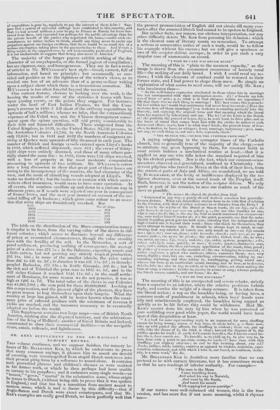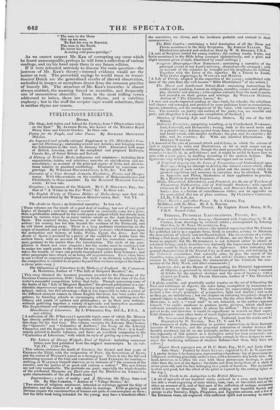MR. KIM'S SUPPLEMENT TO TIIE ARCU,EOLOGY 01 NURSERY RHYMES.
THIS volume continues, and we suppose finishes, the nursery la- bours of Mr. Ilina,ENnEN KER, by which he endeavours to prove that many common sayings, it pleases him to assert are devoid of meaning, were transmogrified from stupid Dutch sentences into their present pithy form by a reference to sound alone. It contains such proverbial phrases and children's rhymes as were omitted in his former work, or which he then perhaps had been unable to torture to his purpdses; and it embraces ninny single words—as "hottest," "gown," " mortal" in the substantive sense, whose origin he traces to Dutch, (without being able to prove that it was spoken in England,) and that too by a transition from ancient sound to modern sense, which is met fit limine by this difficulty—that if Anglo-Saxon and Dutch were exact counterparts, and that Mr.
Krat's examples are really good Dutch, we know perfectly well that
the present pronunciation of English did not obtain till many cen- turies after the assumed Dutch had ceased to be spoken in England. But neither facts, nor reason, nor obvious interpretation, nor any other difficulty deters Mr. KER front pursuing his delusion; which is the clearest case of literary mania we remember. To attempt a serious or consecutive notice of such a work, would be to follow his example without his excuse ; but we will give a specimen or two of the seriptor delirus inersque, in order to put such a very singular case of monomania on record.
0 I WISH MY CAKE WAS DOCGII AGAIN."
The meaning of this is "plain to the meanest capacity," as the image is drawn from the commonest occurrence of homely rural life—the making of our daily bread. I wish I could recal my ac- tions ; I wish the elements of conduct could be restored to their former state, and I had power to shape them anew. So simple an
explanation of what seems to need none, will not satisfy Mr. ;
who lucubrates thus-
" As the well-known expression attributed to those whose fate in marriage
Las not corresponded with their anticipation scents. ! re'hissche my keke WaS (1' houu, er yeen ; q. e., what is it that whispers within me repentance Oh that there was no such thing as marriage! Eh! how comes this reproach- ful feel within me ! would that matrimony had never been invented—[Does the sentence bear nil these meanings?]—a sentence resounding precisely into the travesty, and carrying the original form and that meaning which the literal form has acquired by inheritance and use. The //di of the Latin is the Dutch ei! eh! probably the ground of /oven, hijen, to work hard, to drive piles, and as the burst of sound that comes from him with the stroke he makes at each down-sent effort ;wk, how ? in what way? hiselte, the present tense of kiss- elien, to mutter, to inizz, to whisper ; toxic, marriage, matrimony ; gem, none, not any, no such thing as, not one; peke, reproach, check."
" Nu:Atli:It TUE cliWicir trim r1111TirEn EROm GOD."
A saying originating in the corrupter times of the Catholic church, but so generally true of the majority of the clergy,—not to attribute any gross hypocrisy to them, for constant habit in most minds induces a mechanical routine at least,—that it is applied to any one who falls below the standard required of him by his clerical position. Nor is the fact, which our common-sense
ancestors observed and generalized, confined to Christianity : the devout pilgrims who travel to Mecca at the risk of their lives, from the remotest parts of Asia and Africa, are scandalized, we are told by lluttekumtor, at the levity or inditibrence displayed by the re- ligious showmen, even at the sacred tomb of the Prophet itself. Such, however, is not the notion of the scriptur dairies. We only quote a part of his remarks, to save our readers as much of the iners as possible. " The nearer the church the fierther front God. " Construed in any way, a purely aim-art text—a senseless but generally- known dictum. What can domiciliary station have to do wills that of relation to the Creator, with that oh' either nearness to or distance from the Deity ? take it to lie the rciiclio of this Dutch or Saxon wools, the 711e r,ie'r, die setae heerz.elie deco& seer mot wit ,clam; the one who troubles no one, who is order itself; this is the one the friar so much renowned for circumvent- iog, soon makes himself natter of; it's the quiet, peaceable one that the noto- riously beguiling priest gets his hold over; inkrring that the independent and high-minded one is beyond their reach ; those who think for themselves, they never attempt to impose upon. It should be always kept in mind, in con- struing, that any number of vowels can only sound as one—nie hije sounds tea ; rye'r, re?. ; MOP OW, ; sehie heersche, church ; cair seer as we pro- natinevliabi r, viz. as we do ./i/ither, the adverb; Gehod, God; chic, Le who; nie, never, no one; h&c, vexes, molests ; eye, order, system, propriety ; sehie, sehkr, .sehi!lijrI, soon, quickly, at once ; heersche, masters, domineers over, rail., red, lather, the then customary appellation of the monk, friar, priest ; .hdlg r ,:t.a eon ecnt was the member of; the one belonging to a convent ; a jailor a priced who conkt,ses others, examines them ; seer, very touch, highly ; root., for; on!, au, encircling, circumventing, taking in, sur- rounding enclosing, and thus taking in, humbugging, getting round one; whence our ham, us an inarticulate sound, buzzing, and to loon, as to deceive, delude, take in ; also to try, to catch, or to take within, set about making time tune or song, a cadence; to take in, receive in atone or song; whence probably the (heck tannos, canticle, and our hyma,"&c. &c.
" A RAP ON THE KNUCKLES,"
The meaning of this is an unexpected and severe rebuke, strictly from a superior to an inferior, where the relative positions fOrbids reply, and carries the weight of a sharp censure. It is taken from the literal action ; a rap on the knuckles being, or having been, a common mode of punishment in schools, when boys' hands were idly and mischievously employed, the knuckles being rapped so quickly as to be hit before they could be withdrawn. Ilad Mr. Kale's master done his duty by him when he was perceived of yore scribbling over good white paper, the world would have been spared this disquisition at least.
" A rebuff for sonic equivocating reply in an argument for some shuffling excuse for being wrong ; scents, er Imp hone, de ;Lucke ha's • q. c. there now, take up with pocket the affront, the shuffling is evident; ;here see, put up with, take the shame of it, the trick is clear ; harvest the disgrace of it, the artifice speaks for itself ; de emetic Tel's sounds knuckles, the It has no sound be- fore the n, knee sounds MM. To knockk, as to yield up to, to give way to, to have done with a point in question, seems, toe nude have done with this shoaling, you slippery creature ; an end to this twisting about, you eel ! Nadir, artifice, trick, subtity, cunning as opposed to wisdom, acuteness, equi- vocation, refinement, and with which i take it, our knack, as readiness, dexte- rity, is a same word," &e. &c.
Mr. I3ELLIhNDEN KEa is doubtless more familiar than we can pretend to be with nursery literature, but it has sometimes struck us that he uses readings of inferior authority. For example- " The man in the Moon
Conic tumbling down,
And asked his way to Norwich, And went by the South, And burnt his mouth With supping hot pease-porridge."
If our nurses were well-informed old women, this is the true version, and has more fun it' not more meaning, whilst it rhymes too-
" The man in the Moon Got up too soon, To find his way to Norwich. The man in the South Ile burnt his mouth A-eating cold pease-porridge."
As we cannot suspect Mr. KER of corrupting any verse which he found unmanageable, perhaps he will form a collection of various readings, and try his hand upon them in any future edition. If it were intended seriously to discuss the main question—the justness of Mr. KKR'S theory—internal evidence would set the matter at rest. The proverbial sayings he would trace to transi- tionizcd Dutch are the generalized results of shrewd observation, embodied in images or metaphors drawn front the common practice of homely life. The structure of Mr. KIM'S travesties is almost always crabbed, the meaning forced or recondite, and frequently one of measureless absurdity. Even in the most trifling verses addressed to babes, there are turns, rhyme, and a catching euphony ; but in the stuff the seriptOr ine.rs would substitute, there is neither rhyme nor reason.



























 Previous page
Previous page